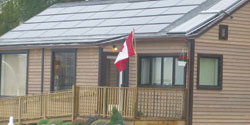Sustainability goes academic

The Northern Light is the net-zero-energy-consumption display home constructed by a team under Andreas Athienitis, who heads the Canadian Solar Buildings Research Network (SBRN) (see story and scroll down to "Here comes the sun"). The award-winning home is located on the Loyola campus.
Courtesy of the canadian solar buildings research network
Sustainability is the capacity to meet the needs of the present — social, economic and ecological — without compromising those of the future. As a field of academic endeavour, it’s all about the study of complex systems and their interactions.
Sustainability can be examined from about as many different angles as there are departments at Concordia, but as Pascale Biron, Graduate Program Director (Geography, Urban Planning and Environment) pointed out, it is often seen from one of two viewpoints – economics or ecology.
As an example, she offered the hotly contested development at Mount Orford. The rhetoric around the project is all about sustainability, but “it’s economic sustainability. The region needs a boost, and the provincial government thinks enhanced tourist facilities are part of the answer.”
Current plans are for two hotels, high-end condos, boutiques and restaurants. The park would be expanded either through purchase or expropriation of a tract of land equivalent to what will be given over to development. However, Biron said, “It isn’t an equivalent replacement. The ecosystems on the mountain and the proposed replacement land are completely different.”
As someone whose passion is river systems, Biron concedes her perspective may skew to the other end of the spectrum, and acknowledged “just because a region contains a working ecosystem doesn’t mean the region is healthy. We need to stop putting the economy and the environment in opposition. That requires different thinking, initiative and a move away from established thought.”
Different thinking is exactly what Lindsay Cole and Geneva Guerin are hoping to facilitate. “We think sustainability is about trying to find a whole,” Cole said. “It’s not about any single socio-economic or ecological approach or issue. These things are all interrelated and you can’t pull them apart.”
Cole and Guerin are team-teaching three new courses on sustainability in Continuing Education through the Institute for Management and Community Development. The courses are designed to help people explore sustainability in order to determine how personal action can make an impact.
“It’s a balance between reflective academic roles and the actual application of ideas and values. We don’t believe sustainability is something you just examine intellectually.”
Biron’s new MSc in Geography, Urban and Environmental Studies also encourages this kind of applied exploration.
“As a multi-disciplinary program looking at natural, social and built landscapes, we’re always talking about human beings and their relationships with these environments.” She believes as the program grows sustainability will play a significant role in graduate work.
“Unless you’re in the world’s remotest regions, human beings are around, and we affect our environment.” If we are going to be sustained, we have to understand the complexities better.
Information regarding the MSc in Geography, Urban and Environmental Studies is at www.gpe.concordia.ca/programs/ms/ or contact Annie Pollock, pollock@alcor.concordia.ca, ext. 2050.
Information about the sustainability courses offered by Cole and Guerin is on the Continuing education web site, sarno.concordia.ca/conted/